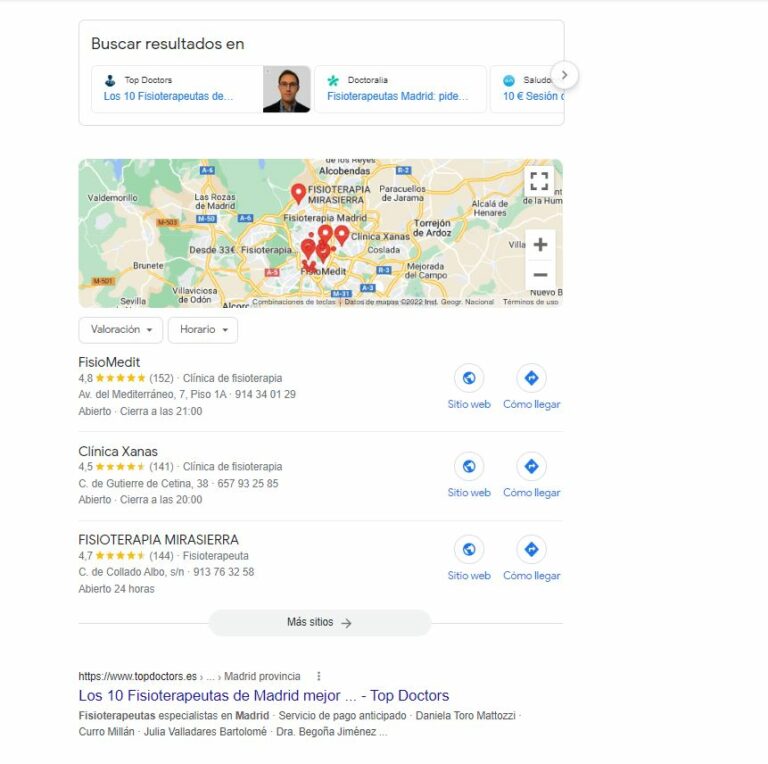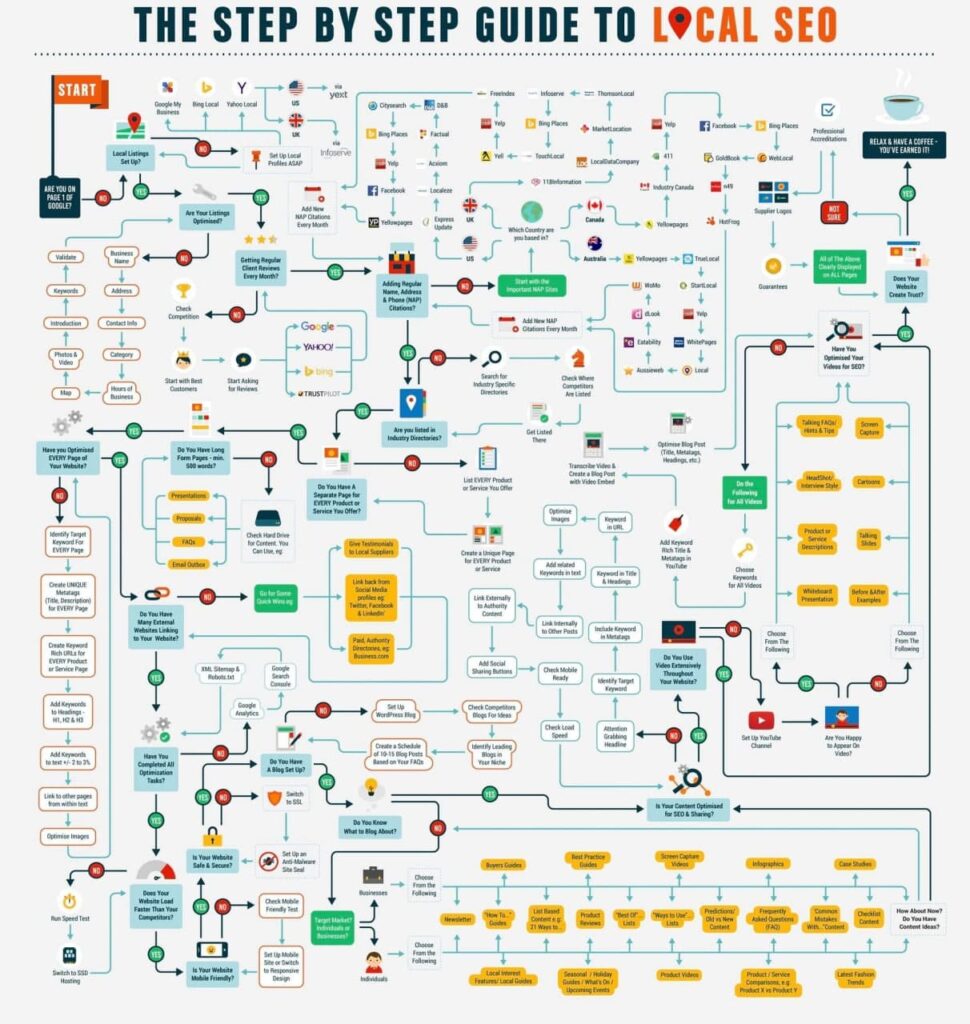Local SEO
Introduction
Local SEO is the related actions to improve the online visibility of your business or company at a local level in the search results of Google or other search engines such as Bing.
Knowing how local SEO works, the positioning factors and the elements to optimize is key to be able to start improving the local visibility of your business and increase potential customers locally.

What is local SEO?
Local SEO is a part of SEO that consists of generating online visibility and acquiring organic traffic through searches carried out by users and potential clients geolocated in a city or area where your company is located or offers services.
Performing local SEO strategies involves knowing how the local SEO algorithm and ranking factors work to improve your business’ visibility in local SERPs in order to improve organic traffic acquisition and generate potential local customers and sales.
Who is local SEO for?
Local SEO is for businesses and companies that have a physical location (local business) or offer services in a specific city or area (service area business).
Why is local SEO important?
Local SEO is important to generate online visibility in search engines, mainly Google, to solve the search needs of local users and potential customers related to your services and products.
- In the last year, searches for “open now near me” have grown by more than 400% year-on-year worldwide (Google).
- More than 50% of all global traffic is done via mobile phones (know, go, do, buy).(bright local).
- 97% of consumers go online to find local businesses.
- 81% of consumers use Google to evaluate local businesses (bright local).
- 42% of millennials who conduct a local search visit a business (review trackers).
- 28% of nearby searches end in a purchase (think with Google)
- 61% of users prefer local businesses that have physical locations and websites (think with Google)
Types of search intent in local SEO
Local SEO search intent approach tries to answer the queries of local users at different stages of the purchase decision or conversion funnel. These are identified under 4 search intentions:
- to do
- to buy
- to known
- to go
Depending on the status and stage of the purchase process the user is in, it will be necessary to respond with one type of content or another.
To do
Generally, users use a mobile device to search for what to do in a certain place when they are preparing to manage visits on their trips. For example, “what to do in London“, “what to do in Madrid“.
To go
Search intent related to the stage closest to the purchase. In this way, any person who performs a “near me” type of search for products or services can be considered to be a “near me” searcher services that are available from local businesses are the subject of business opportunities. “Dentist“, “painters“, “lawyer“, etc.
To buy
Most search intent to buy is local. If your company sells products you should optimize your local SEO for these types of search intentions. “Buy glasses”, “buy air conditioning”, etc.
To known
Thus, for informational searches, these are important at a local level when the characteristics of your business are related or can offer information to users at a local level. Performing certain administrative processes or obtaining information about local products and services such as “how to register in Glasgow“, “best dental practitioner in Bristol“, etc.
Local SEO ranking factors
Local SEO positioning factors have particular characteristics, and it is essential to know them in order to adapt our efforts and optimisations in the right direction to improve our positioning in local rankings.
The ranking factors are divided into 3 areas:
- Proximity.
- Relevance.
- Prominence.
Proximity
The most relevant factor in local searches. This is none other than the location from where the user performs the search. The proximity or remoteness of our business in relation to the user has a significant influence on the search results. The closer the user is to our business, the more likely we are to comply with this ranking factor.
Relevance
This ranking factor refers to how relevant your content is to the query made by the user. It is of vital importance to offer content oriented to the search intentions of our buyer persona in the different parts of the funnel.
In addition, we must ensure that this content is accessible and understandable for the user and search engines.
Prominence
How important is our business? This is precisely what this local positioning factor tries to answer, both quantitatively, with the number of appearances that our brand and business results in other websites, and qualitatively, based on the importance and relevance that the websites that talk about our company have for our subject matter.
Are these appearances positive or, on the contrary, are they negative? It is therefore under this ranking factor that both link building strategies and EAT and brand reputation management come together.

Points to Optimize within a local SEO strategy: How to improve your local SEO
Once we understand the ranking factors of the local algorithm we must consider the optimisation elements within our local SEO strategy to determine their importance and priority in our tactical actions.
The elements to optimize within our local SEO strategy can be divided into 3 groups, within which we will find different sub-sections to optimize our local SEO actions.
Google business profile (GBP)
The GBP listing is the way to tell Google who our business is, what it does, where it is located and to be able to link it to our local website or landing page.
Very important to start generating local visibility and attacking ranking factors such as proximity and relevance, as well as efficient online reputation management of our business, by creating comment, question and answer strategies.
- Correct business name. No keyword spam or staffing
- Location of the company or service area if we do not have a physical location to go to.
- Telephone
- Timetables.
- Attributes
- Brief description of the company.
- Link to our website.
- Main category that best describes our services.
- Services we offer
- Products if this is our case.
- Photographs.
- Work on your comment strategy
- Share and keep your audience up to date with google post
Web SEO
To improve online visibility in local search results it is necessary to optimize the different SEO elements of the website.
Technical SEO
- Improving the performance and technical SEO of the website.
- Offer a good user experience with a mobile-optimised responsive web design.
- Make your website readable and understandable with a good architecture and structure.
- Conduct keyword research that describes and gives relevance to the products/services and characteristics of your business.
- Optimise your meta title, description and image alt text.
- Create strategies to implement structured data on your website. A must to make your content more understandable for google robots.
- Analyse and improve the internal linking of your website to improve the relevance and crawlability of your website.
Contents or relevance
Create relevant and interesting content for your users and business. Through keyword research, determine which are the keywords related to your products and services that users are looking for and determine the content to be created, providing your knowledge and value to the search needs of potential customers.
LOCAL PAGES
The location pages are the urls destined within a local SEO strategy to position our company for one or several locations.
If we offer services in different locations, the creation and optimisation of local landing pages to solve the search intention of the main service/s in our industry in a geolocalized way, is the best practice for local positioning, attracting qualified traffic and potential clients.
Adding specific content of our services and products, linking our company profile listing to each landing page of each location, will allow us to increase visibility in local search results, both organically, as in the localpack, as in Google maps.
Off page SEO
Fundamental strategic element for our SEO and local SEO improvement actions. In this way we try to influence and give indications to the local algorithm in the different ranking factors.
Linkbuilding
Reputation management
“94% of consumers say that positive reviews make them more likely to contact a company” (brightlocal).), which is no longer just a local positioning factor, but a decisive conversion factor in the purchasing process. Improving actions both in the GBP file and in other media will allow us to provide a good EAT, improve our positioning and conversions.
Local EAT
In conclusion:
“Nearly 2 in 3 smartphone users are more likely to buy from companies whose mobile sites or apps personalize information based on their location” (think with google).
If your business is local or offers services in a certain area it is essential to be digital and optimize your local SEO strategies to attract potential customers.
Know how the local SEO algorithm works to be able to focus efforts in a prioritized way according to the needs and state of your business to generate ROI in your local SEO strategies.
Investing in local SEO is investing in your business. Hiring staff, freelancers or agencies is an investment as long as they offer local SEO and marketing strategies and actions with the aim of improving not only local visibility, but also return on investment.
At Isocialweb we carry out local SEO strategies that positively influence business generation. Take a look at our latest local SEO success story.
Frequently asked questions
Local SEO is a digital marketing strategy that focuses on optimizing a website to make it more visible to users who are searching for products or services in a specific area. Learn how to generate visibility and improve organic traffic in this article.
To work on the local SEO of a website, it is necessary to create strategies that allow the optimisation of the Google company profile, as well as the website for the location where it offers products and services. Without forgetting to create content that focuses on topics of local interest and the creation of link building strategies
Algunos ejemplos de KPI
- ROI
- CAC
- VLC
- Tasa de conversión
Links and recommended reading
- https://www.brightlocal.com/learn/local-seo/introduction-to-local-seo/what-is-local-seo
- https://www.thinkwithgoogle.com/marketing-strategies/app-and-mobile/local-search-mobile-search-micro-moments/
- https://www.google.com/intl/es_es/business/resources/
- https://www.thinkwithgoogle.com/intl/es-es/insights/consumer-journey/aumenta-las-visitas-y-las-ventas-en-tienda/
- https://www.slideshare.net/clairecarlile/beyond-the-basics-5-google-business-profile-elements-you-might-not-know-about-but-really-should
- https://www.prnewswire.com/news-releases/nearly-all-consumers-97-now-use-online-media-to-shop-locally-according-to-biakelsey-and-constat-87221242.html
- https://www.brightlocal.com/research/local-consumer-review-survey/#
- https://www.reviewtrackers.com/reports/local-search/
